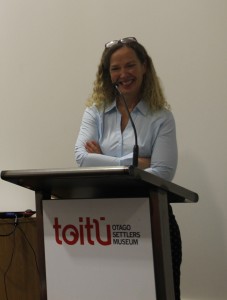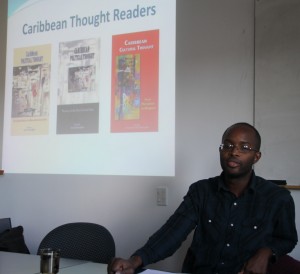Katie Pickles awarded a James Cook Research Fellowship
The Centre for Research on Colonial Culture extends warmest congratulations to Prof. Katie Pickles of the University of Canterbury’s History Programme, and former President of the New Zealand Historical Association, on being awarded a prestigious James Cook Research Fellowship by the Royal Society Te Apārangi. Katie will use the James Cook Fellowship to research heroines in global history, a topic on which she has extensively published during her career. We extend our congratulations on this wonderful acknowledgement of her research excellence and celebrate the recognition this award brings to New Zealand’s colonial and post-colonial histories. All the best for the project, Katie.
Dunedin’s Genetic Inheritance and Caribbean Cultural Thought.
The Centre has recently hosted two riveting research-based talks.
The first, on Sunday 10 May, was part of the Centre’s ongoing project, Global Dunedin. Professor Lisa Matisoo-Smith, a biological anthropologist from Genetics Otago gave a public lecture at Toitū: Otago Settlers Museum, “Who do you think you are – Dunedin?”
Lisa discussed the genetic ancestry of Dunedin’s population based on the testing of randomly selected DNA samples. This research is part of the “Africa to Aotearoa” project, in which Lisa looks at the deep ancestry of New Zealanders, which in turn is part of a wider international study, the Genographic project, funded in part by National Geographic. While one might suspect that Dunedin’s genetic make-up is essentially homogenous from its Scottish heritage, the research shows just how diverse Dunedin’s population is, in line with other major cities in New Zealand.
On Thursday, May 15 visiting scholar Dr Aaron Kamugisha gave a CRoCC seminar, “The Caribbean’s Intellectual History through Culture”. Aaron discussed the global impact of Caribbean theorist’s, particularly CLR James, amongst others, on the development and dissemination of anti-colonial thought and intellectual traditions. He placed these theorists in the context of the development of two threads of intellectual history: Caribbean Studies and Caribbean Cultural Studies, but argued that these thinkers ought to be understood in term of Caribbean radical thought.
Introducing Global Dunedin
March 23 is Otago Anniversary Day, but it also happens to be the occasion for the launch of a new initiative from the Centre for Research on Colonial Culture: Global Dunedin. Have a look at Global Dunedin’s Blog, which is designed to serve as a forum for discussing Dunedin’s historical development and its changing economy, social life, and cultural pattern. The project will showcase how the city has changed over time and the ways in which its pasts have shaped its current and future prospects. The blog – together with an associated Facebook page and Twitter account (@GlobalDunedin) – will disseminate reflections on the city’s history and life here now.
In addition to a social media presence, the Global Dunedin project team are also running a public lecture series in conjunction with Toitū Otago Settlers Museum: in these Sunday afternoon talks, leading local researchers and thinkers will reflect on different aspects of Dunedin’s past and present.
Follow us and join in the conversations!




